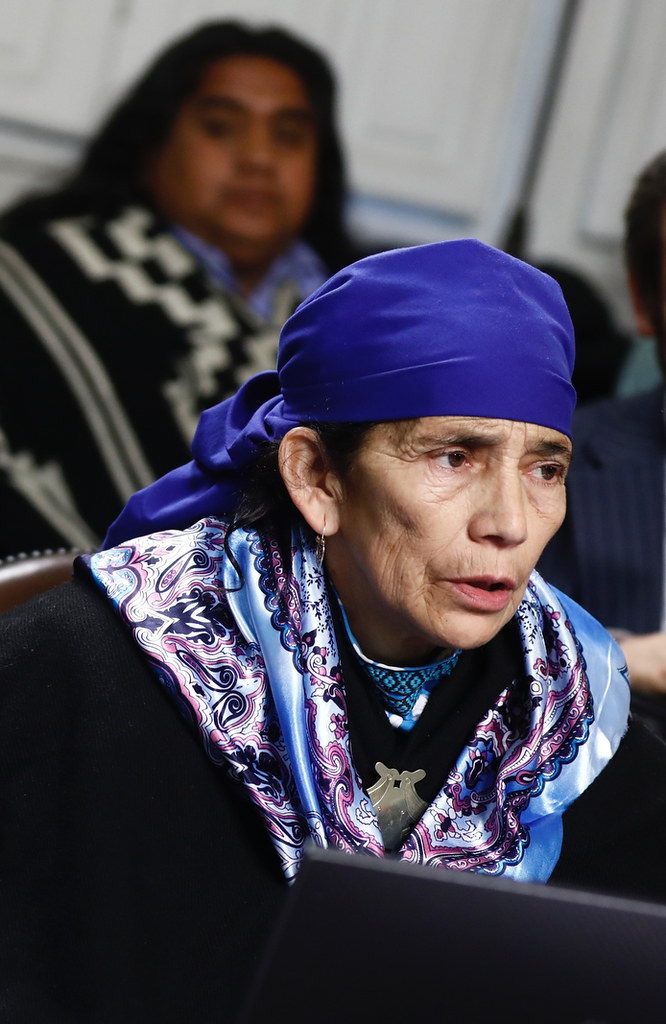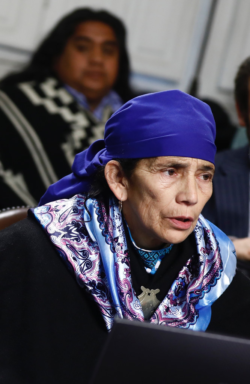Chile's Constitutional Convention election: a victory for feminism

Belén Alvarez Werth from the University of Queensland, Australia, and CDE member Daniel Valdenegro Ibarra outline some of results to the recent historical elections in Chile, namely to its Constitutional Convention, which will draft a new constitution for Chile. They explain how these elections have symbolised a rise of feminism in the political discourse.
In the weekend of the 15 to 16 of May of 2021, an unprecedentedly large and complex election took place in Chile. After several delays due to the COVID-19 pandemic, the promised election of members of the Constitutional Convention (a promise made back in 2019 after weeks of social unrest demanding deep social changes) took place with increased sanitary measures and in tandem with the election of Governors, Mayors and Municipalities Council Members. A turn to the left was expected, after the events of October 2019, but the struggles of the pandemic and the rise of a new Left brought a much welcomed surprise in this electoral cycle. This time the protagonists are almost all women, and almost all feminists.
The stage
Late 2019 was a turbulent moment in history for Chile. Huge protests demanding the reduction of social inequalities by ending the “neoliberal” style of government that has been predominant the last 30 years in Chile took to the streets every Friday for months. The anger of the people receded a little with the announcement to hold a referendum that would ask Chileans if they wanted to change the current constitution of the country, redacted under the dictatorship of Pinochet. But then the pandemic came, and the right-wing conservative government of Piñera imposed strict mobility control and a very budget-conscious social spending plan. Covid and mobility limitations were disproportionately affecting the poorest people among the Chilean citizens, while benefiting the richer ones.
The Referendum asking whether the Constitution should be rewritten was held the 25 of October 2020, in the middle of the pandemic, and a year later of the social uprising of October 2019. The option to rewrite the constitution won by a landslide, and the next necessary step was to set up the election for the Members of the Constitutional Convention, the constituent body in charge of drafting the new constitution. The election process allowed for independents - after meeting certain requirements- to run for a seat in the Convention, which opened the door for a wide variety of new political faces to step in, coming from many different professional and social backgrounds, but all sharing a strong connection with the social reality of the country and the inequalities the pandemic was making evident. Although these new political faces were emerging with a lot of strength, only a handful of political parties paid serious attention to them. Traditional center-left parties were not able to recruit many of them, but new leftist parties were considerably more successful in recruiting these new leaders.
The act
So, this was the stage for the new upcoming elections: Right-center and Far-right parties, aware of their disadvantage as representatives of the establishment that the people of Chile blame for the social inequalities, runned together as a coalition, with the express goal of obtaining a least ⅓ of the seats in the Constitutional Convention, which would allow them the veto-able minority. Traditional Center-Left and Left parties run together in their historical coalition, confident that the current turmoil and the mismanagement of the pandemic of the current government would grant them the favor of the voters. And, finally, the left-leaning new parties plus their independent sympathizers loosely organized in a third block, characterized mainly by being new faces in politics with strong relations with their base of voters. Under this scenario, pollsters predicted a clear win for the traditional center-left.
In the end the results couldn’t have been further away from the projections. First, the right wing coalition did not get the ⅓ in the Convention as projected, obtaining only 37 seats of the 52 necessary to have a ⅓ of the 155 seats available. But even the right wing failure in this election dwarfs in comparison with the failure of the traditional center-left parties. While they projected to be the biggest force in the Constitutional Convention, they got relegated to 4th place with 25 seats after 2 coalition of new political movements composed mainly of independent left leaning politicians and new social leaders: all new faces, all more connected with the reality of the voters.
The results of the election also brought a lot of good news for women in Chile. It was established before the election that the convention had to be gender paritarian. This had been seen as a way of supporting women to be elected. But in the end, the parity rule was actually used to support men being elected. Left unbalanced, the Constitutional Convention would have been comprised by 84 women and 71 men. After the paritarian correction, made by district, we got 77 women and 78 men. These results in the Convention were also reflected in the election of Mayors and Governors, in which we are seeing many new faces, a lot of them women, which took several of the most important municipalities in Chile (such as Santiago or Viña del Mar). These municipalities are so important, that traditionally, whoever sits in them is a strong candidate for a future presidential election. But who are these new people?
The players
In an article recently published by Foreign Policy, the authors declared that “Besides expanding the size of government, it’s not clear the delegates agree on much else” casting a shadow of uncertainty over the election. These claims seem to us like a stretch. We do know what the elected members of the Convention agree upon. There is even a survey carried out by a major news outlet detailing the profile of the Constitutional Convention. If you understand Spanish we invite you to read that article, because it exposes that the members of the Convention don’t have outlandish ideas. And while it is true that some propositions imply more social rights, grandiose promises of unlimited wellbeing are not what we would say characterized the members of the convention. No, it's something else. Something that inspires much more hope in the future than bold but empty promises. They are feminist.
Such is the conclusion of a study carried out by independent scholars in which they detected that 57% of the elected members have a pro-feminist agenda -not just a pro-women agenda, which the article describes as policies, while well intentioned, still perpetuate traditional gender roles. In the article, the authors point out that it is “the search to overcome oppressive logics that can be considered as a common theme” in all the pro-feminist members of the Convention.

Machi Francisca Linconao. Spiritual Leader and member of the constitutional convention representing the Mapuche people
This feminist wave not only was reflected in the Constitutional Convention election but also in the Mayors and Governors elections. In the Santiago Municipality, Capital of the country, in a rather historical turn of events, the seat was taken by a communist woman. Irací Hassler, 30. Economist. Her campaign had strong emphasis on feminist policies. Something similar happened in Viña del Mar, one of the biggest cities in the V Region in Chile, considered an unbeatable stronghold of the conservatives. This year though, to the surprise of all, the winner was Macarena Ripamonti, a 29 year old lawyer, and a member of the Frente Amplio, the left wing coalition formed by the leaders of the student movement. Again, Ripamonti’s campaign had strong links with the feminist movements in Chile, a clear sign that people wanted change and were no longer trusting the traditional establishment.

Irací Hassler, Mayor of Santiago, Chile
In the Governor's election, again, the Metropolitan Region in which Santiago is in, is probably the most important one. This election is not yet resolved, though, as it requires absolute majority, and a ballotage is upcoming. However, the surprise here is that Karina Oliva, a 36 years old political scientist, native of possibly the most poor and marginalized neighbour of the city, is about to take the seat of Governor, pushing a strong feminist approach of how to manage the mega city of Santiago. Ain't that cool?

Macarena Ripamonti, Mayor of Viña del Mar, Chile
Even the conservative parties are noticing the feminists trend and started including influential women among their ranks. And with relatively good results. One of them is Marcela Cubillos, a representative of the conservative parties, and now a member of the Convention. A similar story applies for Teresa Marinovic, a philosopher and university professor well known for her controversial and conservative opinions. They both are currently strong voices in the right wing and conservative circles of Chile. And while they are by no means feminist, it is still refreshing to see women in leaderships roles, even among such traditional parties.
In sum, this electoral cycle has brought us hope. A “feminist hope” of truly addressing the structural inequalities that plague our society, our politics and our cities. And the fact that we have a renewed hope in politics -in a country where we had lost all hope- is mainly because this was a victory for feminism.
Belén Alvarez Werth (University of Queensland, Australia) and Daniel Valdenegro Ibarra (University of Leeds, UK)
Belén tweets as @beleaw and Daniel as @dansanleeds
The views expressed in the blog post are the views of the authors.
Photos sources:
Machi Francisca Linconao. Spiritual Leader and member of the constitutional convention representing the Mapuche people: "Comisión investigadora Huracán0005" by Diputadas y Diputados is licensed with CC BY-NC-ND 2.0. To view a copy of this license, visit https://creativecommons.org/licenses/by-nc-nd/2.0/
Irací Hassler, Mayor of Santiago, Chile: Alex Araya, CC BY-SA 4.0 <https://creativecommons.org/licenses/by-sa/4.0>, via Wikimedia Commons
Macarena Ripamonti, Mayor of Viña del Mar, Chile: https://twitter.com/MacaRipa/photo
